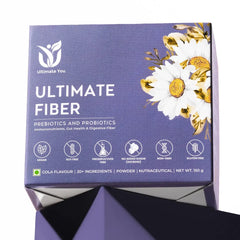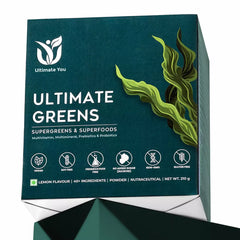Your gut is the foundation of your health. Discover the power of gut health supplements to improve digestion, boost immunity, and restore balance naturally.
Are you battling with annoying digestive issues?
Experiencing bloating or heartburn more often than you'd like? Then, it could be a sign of imbalanced gut health. Nowadays, it’s like a hidden epidemic!
An imbalanced gut doesn't just cause digestive problems; it can also impact your mood, immune system, and body’s energy levels. Taking control of your digestive health is essential for optimal well-being.
Let's explore the importance of maintaining a balanced diet, the function that supplements play in supporting gut health, and the best supplements for gut health.
What is Gut Health?
The health of the gut is becoming more and more critical and essential for good health. Nevertheless, many people tend to have gut-related problems which may hinder their routine activities. Common issues like the ones mentioned above are often caused by gut bacteria or an improper diet.
Although many medical interventions and drugs are prescribed, they usually come at a high cost and may only suit some. This is the cause of side effects and the prolonged use of drugs.
Natural remedies indeed provide an uncomplicated and successful option. The gut friendly supplements restore the equilibrium of the digestive system, which is achieved by prebiotics, probiotics, and high fibre foods.
These natural supplements support digestion, strengthen the immune system, and contribute to nutrient absorption. They are affordable, easy to fit into your daily routine, and generally safe. These supplements are an ideal choice to enhance your gut health.
What Gut Bacteria Do For You?
The human gastrointestinal microbiota contains around 300 to 500 bacterial species, making up nearly 2 million genes (the microbiome). In fact, the number of bacteria in the gut is about ten times greater than all the cells in the human body. The gut microbiota is the term used to describe the species of bacteria that reside in the gastrointestinal system.
Gut microbes control our natural immune responses and influence the likelihood of developing chronic diseases. There are numerous lifestyle factors, such as diet, antibiotic use, sleep and exercise, that may influence health through mechanisms involving gut microbes. The optimal performance of these processes relies on a healthy and diverse gut flora, which can be supported by a balanced diet rich in fibre, probiotics, and prebiotics.
- Digestive Health: The gut's preliminary function is to break down foods into nutrients and absorb them into the bloodstream, turning them into short-chain fatty acids that provide energy and support gut health.
- Nutrient Absorption: They aid in the absorption of minerals, including calcium, magnesium, zinc, and iron, as well as the production of several vitamins, including vitamin K and B vitamins (Folate, Biotin, and B12).
- Immune System Support: A balanced gut microbiota supports your immune system by interacting with immune cells and helping to reduce inflammation, potentially reducing the risk of infections and autoimmune diseases.
- Metabolic Regulation: An imbalance in gut bacteria can lead to obesity and diabetes. Gut bacteria play a role in regulating metabolism and can influence body weight and fat deposition.
- Mental Health: The gut-brain axis directs to the pathway that links the gut and the brain. Gut bacteria can influence mood, stress levels, and cognitive function, impacting mental health and well-being.
- Protection Against Pathogens: By maintaining a healthy balance, gut bacteria help prevent harmful pathogens from taking hold and causing infections.
- Gut Barrier Function: Gut barriers play a critical role in holding the integrity of the gut lining, preventing leaky gut syndrome, and ensuring that only beneficial substances are absorbed into the bloodstream.
Science Behind Gut Health
Gut -brain axis
The gut-brain axis is a bidirectional network that connects the intestinal and central nervous systems, influencing mental health and cognitive function. Not only does this network involve anatomical connections, but it also includes humoral, endocrine, metabolic, and immunological pathways.
The gut and the brain are linked by the visceral nervous system, the hypothalamic-pituitary-adrenal (HPA) axis, and gastrointestinal tract nerves. This allows communication between the brain and the gut, influencing immune cell activity and mental health.
Gut-immune axis
The gut-immune axis plays a critical role in immune-mediated inflammatory diseases (IMIDs) by connecting genetic susceptibility and environmental factors. Recent advances in understanding microbiome-immune interactions have emphasised their impact on immune-related diseases, leading to the development of targeted therapies like faecal microbiome transplantation (FMT). Although FMT holds promise, particularly for conditions such as inflammatory bowel disease (IBD), challenges persist in defining a 'healthy' microbiome.
Imbalance of gut microbiota (Dysbiosis)
Health concerns like gastrointestinal illnesses, metabolic disorders, and mood disturbances can result from dysbiosis, an imbalance in the gut microbiome. Changes in gut microbiota appear to influence multiple inflammatory pathways in older adults and may contribute to systemic chronic inflammation. Additionally, dysbiosis has been positively correlated with increased fat mass, pro-inflammatory biomarkers, and insulin resistance.
Types of Gut Bacteria
Different types of gut bacteria work together to maintain a healthy gut microbiome, influencing digestion, immunity, and overall well-being.
- Bifidobacterium: Supports immune system and digestion
- Lactobacillus: Produces vitamins and hormones, aids in digestion
- Streptococcus: Helps with lactose tolerance and immune system
- Bacteroidetes: Breaks down complex carbs and fibres
- Firmicutes: Involved in energy production and vitamin synthesis
- Actinobacteria: Produces antibiotics and anti-inflammatory compounds
- Proteobacteria: Helps with gut motility and immune system
- Enterobacteriaceae: Supports gut health and immune system
Good Gut Bacteria vs. Bad Gut Bacteria
|
Good Gut Bacteria |
Bad Gut Bacteria |
|
These bacteria reside in the intestines and aid in food digestion and nutrient absorption. |
There are harmless bacteria in your gut, but if they grow too much, they can make you sick. |
|
Improves digestive health, immune function, and cardiac health. It aids in weight management and prevents cancer. |
When harmful bacteria replicate and produce toxins, they can cause painful symptoms such as abdominal pain, fever, and diarrhoea. |
|
These substances, such as arginine and glutamine, are not only beneficial for generating short-chain fatty acids and vitamins like vitamin K and folic acid but also play a crucial role in preventing harmful bacterial infections. |
Other symptoms may be more subtle, such as bloating or irregular bowel movements. |
|
Examples
|
Examples
|
How To Improve Gut Health?
- Fiber-rich foods: Incorporate fruits, vegetables, whole grains, and legumes to boost digestive health, promote regular bowel movements, and feed beneficial gut bacteria.
- Prebiotic-Rich Foods: Consume foods like garlic, onions, and bananas that nourish beneficial gut bacteria and enhance their growth and activity.
- Probiotic Foods: Include yoghurt, kefir, and kimchi in your diet to introduce beneficial bacteria that support a balanced gut microbiome.
- Limit Fats /High-Fat Foods: Cut down on high-fat intake to prevent inflammation and maintain a healthy proportion of gut bacteria.
- Excessive use of Antibiotics: Use antibiotics only when necessary, as overuse can disrupt gut microbiome balance and lead to dysbiosis.
- No Processed Foods: Minimise intake of processed foods high in sugars, preservatives, and additives to support a healthy gut microbiome and prevent intestinal inflammation.
- Avoid Trans and Saturated Fats: Limit trans and saturated fats, which cause chronic low-grade inflammation in the gut and increase intestinal barrier permeability.
- Include Antioxidants Foods: Eat foods rich in antioxidants, like berries and green tea, to reduce inflammation and oxidative stress in the gut.
- Polyphenol-Rich Diet: Dietary polyphenols like berries, green tea, and dark chocolate in your diet promote immunity and maintain intestinal health.
- Exercise Regularly: To enhance gut motility, reduce inflammation, and maintain diverse and harmonious gut flora, get frequent exercise.
Best Supplements for Gut Health
Prebiotics promote the growth of probiotics, improve intestinal microbial diversity, regulate immunity, resist pathogens, influence metabolism, increase mineral absorption, and enhance health. Additionally, they encourage the production of short-chain fatty acids (SCFAs), lower the pH of the intestine, and are beneficial for human health.
Psyllium Husk shows a significant effect on microbial composition and is capable of retaining water in the intestine, increasing stool water, easing defecation and altering the colonic environment. It also improves bowel movements and supports gut health.
Oats, being gluten-free, are a functional prebiotic ingredient with soluble and insoluble fibre, plant proteins, unsaturated fats, and antioxidants. This unique combination of nutrients makes them a powerful promoter of gut health and microbial diversity.
Triphala, Phytochemicals found in Triphala, including quercetin and gallic acid, support the growth of beneficial bacteria like Bifidobacteria and Lactobacillus while also inhibiting the growth of harmful gut bacteria such as E. coli. The bioactivity of Triphala is utilised by gut microbiota to produce a range of anti-inflammatory compounds.
Chamomile helps relieve gastrointestinal issues like diarrhoea, constipation, and indigestion by reducing the inflamed or irritated mucous membranes that line your digestive tract. Purchasing individual ingredients like prebiotics, probiotics, Triphala, chamomile, and beetroot separately can be costly and show adverse consequences like stomach upset and indigestion when consumed in excess. Instead, opt for a reliable supplement that provides a balanced blend of these ingredients in a recommended daily dosage.
Ultimate Fiber is an excellent alternative, combining the benefits of prebiotics, probiotics, and natural ingredients to improve gut health, aid digestion, and support weight management. Sustainably sourced and manufactured in a certified facility, this gut health powder offers a convenient and effective solution for a healthier digestive system.
"Show Your Gut Some Love with Ultimate Fiber!"
Probiotics benefit in restoring the gut microbiome composition, preventing gut inflammation, and fortifying the intestinal barrier. Additionally, probiotics introduce beneficial functions to the gastrointestinal tract, such as improving digestion and absorption of nutrients.
Ginger accelerates gastric emptying, reduces nausea, improves digestion, and offers anti-inflammatory benefits.
Curcumin can maintain high concentrations in the intestinal mucosa, modulate gut barrier function, and reduce inflammation to promote health. Supplementing with curcumin restores intestinal barrier function and can change the gut microbiome.
Glutamine, Supplementing with glutamine can help people with impaired gut permeability. It is a critical factor in enhancing the expression of tight junction proteins, balancing the microbiota, and lessening inflammation when gut mucosal irritation occurs.
Apple cider vinegar contains prebiotics and probiotics. Both of these can support a healthy gut microbiome and improve the immune system. It Aids digestion, balances pH levels, and increases intestinal barrier permeability.
Gut health issues like digestive problems, bloating, and low energy can significantly impact your daily life, but incorporating greens into your diet can be a game-changer.
That's where Ultimate Greens comes in - a convenient supplement offering a blend of 40+ plant-based ingredients designed to support gut health and overall wellness. This advanced gut health powder is easy to incorporate into your daily routine, unleashing the power of super greens and superfoods to elevate your health journey.
"Optimise Your Gut Health with Ultimate Greens!"
How to Choose Best Supplement for Gut Health?
Selecting an effective gut health supplement can be challenging. However, by considering the following critical aspects, you can make a knowledgeable judgement:
Brand Reputation
When it comes to gut health supplements, brand reputation matters; look for brands with a proven track record of producing high-quality products. A reputable brand will be transparent about its manufacturing processes and sourcing of ingredients.
Customer Reviews and Ratings
Check online reviews from multiple sources, pay attention to the overall rating, and read the comments to understand the experiences of other customers, such as improved digestion or reduced symptoms.
Organic Ingredients
Opt for supplements made with organic ingredients which are free from harmful pesticides, herbicides, and synthetic fertilisers. This reduces the risk of contaminants and promotes a healthier gut.
Industry Leading Certifications
Look for certifications from reputable third-party organisations, such as
HACCP, US FDA, GMP compliance, ISO, pesticide-free assurances, and FSS 22000 certification to ensure that the product meets strict standards for quality, purity, and potency.
Vegan, Preservative-Free, No Added Sugars, Gluten-Free
Consider your dietary restrictions and preferences when choosing a supplement. Ensure that the product is:
- Vegan: free from animal-derived ingredients
- Preservative-free: free from artificial preservatives
- No added sugars: free from unnecessary sugars
- Gluten-free: suitable for those with gluten intolerance or sensitivity
Pricing
Compare prices from different brands and retailers. Be wary of highly cheap options, as they may compromise on quality. Consider the cost per serving and the overall value for money.
Shelf Life
Check the expiration date or shelf life of the product. Ensure that the product will remain potent and effective throughout its shelf life.
Allergen Friendly
When choosing a gut health supplement, consider allergen-friendly options to minimise the risk of adverse reactions. Look for products that are:
- Free of common allergies, including soy, dairy, eggs, fish, peanuts, and gluten.
- Processed in facilities that adhere to strict allergen control measures.
- Clearly labelled with allergen warnings or statements.
Recommended Dosage
To determine the most suitable dosage for your specific requirements, please follow the recommended dosage on the label. Be aware of:
- Serving size: the amount of supplement to take per serving
- Frequency: how often to take the supplement (e.g., daily, twice daily)
- Duration: the recommended length of time to take the supplement
Available Forms
Gut friendly supplements come in various forms to suit individual preferences and needs. Choose from:
- Powder: convenient for adding to smoothies, water, or food
- Capsules: easy to swallow and often enteric-coated for targeted delivery
- Tablets: compact and portable, but may require more excipients
- Gel Form: a convenient and easily digestible option, often in a single-serving packet
When selecting a form, consider factors like:
- Ease of use
- Bioavailability (absorption rate)
- Personal preferences (e.g., taste, texture)
- Specific health goals (e.g., targeted delivery for gut health)
Do’s & Don’ts for a Healthy Gut
|
Do’s |
Don'ts |
|
|
Conclusion
The digestive system, also known as the 'gut', contains trillions of bacteria. The abundance and diversity of gut bacteria are crucial for optimal health and well-being. While many people worry about harmful bacteria that can cause illness, there are also numerous 'friendly' bacteria throughout the body, particularly in the gut. Making lifestyle choices such as exercising and consuming high-fibre foods can significantly support our gut health.
When selecting a gut health supplement, it's essential to carefully consider several factors to ensure it aligns with your specific needs and goals. By evaluating these essential aspects, you can identify a high-quality supplement that supports your unique gut health requirements. For personalised guidance and tailored solutions to meet your individual needs, consult with a healthcare expert.
Disclaimer
The information provided is for educational purposes only and is not intended to be a substitute for medical treatment. If you're pregnant, nursing, taking medication, or have a medical condition, it's better to consult a healthcare professional. Ultimate You does not provide any guarantee regarding the accuracy, adequacy, completeness, legality, reliability, or usefulness of the information and disclaims any liability arising from it.

Sai Tirumala Vasireddy
Certified Nutritionist
Holds a master’s degree in Food and Nutritional Sciences and specialised in Applied Nutrition. Passionate about sports nutrition, she focuses on enhancing individual’s performance through customised diet plans and sustainable eating habits. Her expertise and enthusiasm for healthy living make her a valuable resource for those seeking to improve their health and performance.
Tags
Frequently Asked Questions
Which is the best supplement for gut health?
Supplements for promoting gut health include fermented foods, L-glutamine, probiotics, prebiotics, digestive enzymes, and fiber sources such as psyllium husk, fennel seed, and oat fiber.
How to improve gut health?
Foods high in pre- and probiotics nourish beneficial gut bacteria and help maintain a balanced gut flora. Additionally, fibre-rich foods aid in soothing the digestive system and regulating bowel movements.
When to take l-glutamine for gut health?
The best time to take glutamine supplements is 15 minutes prior to a meal on an empty stomach. It is recommended to take L-glutamine 2-3 times per day before meals.
Does fasting heal the gut?
Prolonged intervals of fasting lower the overall bacterial burden, which is linked to improving gut health and longer lifespans.
How long does it take to heal a gut?
Several factors come into play, including gut microbiota composition, digestive system reaction, issue severity, and individual health concerns like diet and lifestyle.
What kills bad bacteria in the gut?
Foods rich in natural antimicrobial properties, such as fermented foods and probiotics, should be incorporated to introduce beneficial bacteria that eliminate harmful bacteria in the gut.
- Choosing a selection results in a full page refresh.
- Opens in a new window.
15%

on your next order
By submitting your email address, you agree to receive marketing emails from Ultimate You at the email address provided. We may use information collected about you on our site to suggest the products and offers. you can withdraw your consent at any time by following the unsubscribe instructions in any email we send to you. view Terms and Privacy. Contact Ultimate Customer Care at #204-8430 Saint Monica Building, near Char Miner, Hyderabad, India, 203455.









